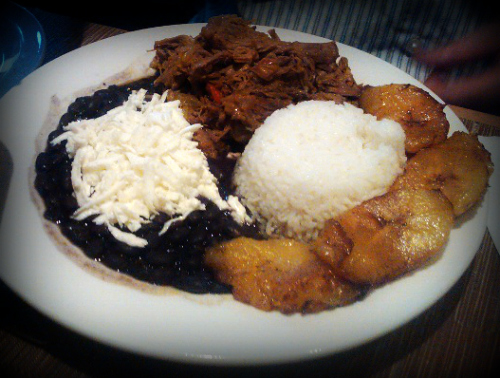
by hjunderway | Nov 18, 2013 | 2013, Bilingual, Cultural Differences, Culture, Education, Expat Life, Eye on Culture, France, International, Living Abroad, Milestones, Motherhood, Moving, Preschool, Relocating, School, Stress, Traditions, USA, Working Mother, World Moms Blog, World Motherhood, Younger Children
 The day I gave birth to my son, HJ, is a day I’ll never forget. Induction nightmare? Check. Post baby snuggles? Check. September 3rd birth date? Check.
The day I gave birth to my son, HJ, is a day I’ll never forget. Induction nightmare? Check. Post baby snuggles? Check. September 3rd birth date? Check.
Little did I know at the time how much my son’s birthday would impact his development and education but flash forward to 2013 and here I sit, faced with the first of many educational concerns.
Living in Paris meant that on September 4th, 2012, my son formally entered the French education system. At just three years old, he was invited to attend nursery school, or maternelle, which comprises the first three years of schooling. Due to his inability to speak French, my son was invited to attend school four mornings per week from 8:30 a.m. until 11:40 a.m. As he began to thrive in school, his teacher gently suggested that I begin leaving him for one full-day per week after the holiday break in December. By late-January, he was attending school all day until 4:15 p.m., eating French catered lunch in the cantine (cafeteria), enjoying rest time, and thriving.
Combining his easy going attitude and tall stature (95% percentile for height), most parents thought my son was one of the older kids in the class. In order to start school in September, children must turn three by December 31st, and with a September 3rd birthday, my son was one of the younger students. When I would share this with the parents, they’d say, “Wow, but he is so tall!”
Our plans for HJ’s education were that he would be in French school until we moved home, and at that point he’d transition into kindergarten at the local school. When our contract ended sooner than expected, I began the joyous task of figuring out what options we had to continue HJ’s formal education, and the results were shocking.
HJ misses the US cut-off for kindergarten by two days. This means that he has to wait until he is six to enter kindergarten! I neatly placed that reality aside and instead focused on what education he could receive now, at four years old.
My choices floored me.
Option A) the public school offers a “lottery” for kids ages 3-4 for preschool, and the schedule only allows kids to get one of three spots: two mornings from 8-11, three mornings, four afternoons, or five mornings. And all this for the staggering price of more than $6,000.
Option B) the local Montessori school, which has no openings until September of 2014, and again runs mornings only. Did I mention that they also refused to reveal the actual cost of the program?
And finally, Option C) a local Catholic school that offers five all-day classes for around $7,000.
So what’s the big deal?!
Children in France have access to all-day education beginning at age three for FREE, with master’s degree trained teachers. While every school isn’t as amazing as the one my son attends, the French may be on to something. For two working parents, morning-only, formal education settings are an inconvenience, and for single-income families, shelling out over $6,000 for a few hours a day may be too much.
All around the United States, parents are struggling with making hard financial decisions and I wonder if it seems fair that we have to do so when it comes to our children’s educations?
For us, having HJ evaluated and exploring how he measures up to his peers is one solution. How he falls in the range of social and emotional intelligence will give us a window into how he may fair in kindergarten and will be necessary if we plan on fighting the school district for a spot in kindergarten if it seems logical and appropriate for our son.
The second option is to just ride the wave and instead allow our six year old to join his peers, perhaps giving him a leg up on his classmates. Then I question, “Will he be bored?” “Too big?” At this point I’m just not sure which choice is best for our little guy but it did get my wheels moving, wondering about the significant differences in how each country approaches education. What is it like for children in Germany, or Canada? Do parents struggle with similar issues in Sydney, Australia?
So please, World Moms Blog readers, share your location/country’s educational process! When does school begin? When did your children start school? Anything you wish you could change about your child’s educational experiences?
This is an original post to World Moms Blog from Jacki, mother of one now living in XXX but formerly blogging from Paris, France.
Jacki, or “MommaExpat,” as she’s known in the Internet community, is a former family therapist turned stay-at-home mom in Paris, France. Jacki is passionate about issues as they relate to mothers and children on both domestic and international scenes, and is a Volunteer Ambassador for the Fistula Foundation. In addition to training for her first half marathon, Jacki can be found learning French in Paris and researching her next big trip. Jacki blogs at H J Underway, a chronicle of her daily life as a non-French speaking mom in France.
More Posts

by Ecoziva (Brazil) | Oct 14, 2013 | 2013, Babies, Being Thankful, Brazil, Child Care, Childhood, Culture, Domesticity, Eye on Culture, Family, Health, Home, Inspirational, Life Balance, Maternal Health, Me-Time, Motherhood, Parenting, Religion, Spirituality, Traditions, Working Mother, World Motherhood, Younger Children
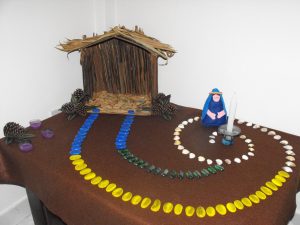 My maternity leave is now coming to an end, but throughout it a typical week day has meant about 12-14 hours alone with the kids.
My maternity leave is now coming to an end, but throughout it a typical week day has meant about 12-14 hours alone with the kids.
I usually wake up at 5:20 a.m. and my husband leaves with our eldest around six. I spend my mornings with our 2 ½ year old girl and our six month old baby boy. Our son returns from school approximately 1:30 p.m. Sometimes my husband returns early, but he usually gets home between 6 and 8 p.m. depending on traffic, his schedule, etc.
I love my kids dearly. Yet any mother knows that such a routine is not easy. On the typical day, by 6 p.m. my patience starts to wane. By nature I have a calm personality, but if there is screaming on my side, 90% of the time it will be after 6 p.m.
I once heard that 6 p.m. is one of the most difficult times of the day. On an individual level it is the time when stress peaks and on a collective level it is the time when most crime, car accidents and other such things happen. I don’t know if there is data backing that, but in a way it does make sense.
In my case, it is around 6 p.m. that the less-than-noble feelings will start to take over my mind, such as resentment, self-pity and repetitive worrying about pending work (although I have been legally on leave and have not been teaching, I did choose to maintain some activities from home). Other days I wish I could just stop working and truly be a full-time mother.
One thing that has helped is practicing acceptance and gratitude: A student sent me her research project two weeks ago and I haven’t even managed to open the file. Sorry, I am doing the best I can. My daughter has been screaming for 15 minutes in a temper tantrum. How great that she is healthy and her lungs are working! The kitchen sink is piled with dishes and the whole house is a mess. Things will get better as the kids grow older.
Of course it is easier said than done and one thing I try to do every day is to pray that my patience lasts past the kids’ bedtime.
I recently thought about how in the past it was a custom here in Brazil – a mostly catholic country – for the radios to play the Ave Maria in Latin at 6 p.m. In the small town I lived in when I was little, the Catholic church’s bells also tolled at six.
I haven’t been much of a radio listener for the past few years so I went on the web to check if the custom was still present. I learned it is a practice that has been carried out here in Brazil for the last 54 years. It comes from an old Portuguese tradition that in turn derives from the Angelus [*] – a Christian devotion recited at 6 a.m., midday and 6 p.m., which refers to Mary and the Annunciation. In simple terms, it is a time of prayer and meditation.
While reading about the 6 p.m. devotion and thinking about the emotional condition of mothers who spend the whole day alone with their children, I realized that it was the kind of practice that makes sense in the context of motherhood. After all, regardless of religion or debates on the specifics of Mary’s story, in a greater context she can be seen as a symbol of an inspiring and caring mother.
With that in mind, this week I am experimenting with short “Mary meditations” around 6 p.m. to see if it helps extend and deepen my patience and acceptance.
And you? What strategies do you use to help you face the challenges of the day-to-day motherhood routine?
[*] If there are any Catholics out there reading this and I am explaining this wrong please correct me! I was sort of raised Catholic in a Catholic country but I’m not actually Catholic, so I don’t have in-depth knowledge of the Angelus.
This is an original post to World Moms Blog from our devoted writer and mother of three in Brazil, EcoZiva.
The photo used in this post was taken by the author.
Eco, from the greek oikos means home; Ziva has many meanings and roots, including Hebrew (brilliance, light), Slovenian (goddess of life) and Sanskrit (blessing). In Brazil, where EcoZiva has lived for most of her life, giving birth is often termed “giving the light”; thus, she thought, a mother is “home to light” during the nine months of pregnancy, and so the penname EcoZiva came to be for World Moms Blog.
Born in the USA in a multi-ethnic extended family, EcoZiva is married and the mother of two boys (aged 12 and three) and a five-year-old girl and a three yearboy. She is trained as a biologist and presently an university researcher/professor, but also a volunteer at the local environmental movement.
More Posts

by Elizabeth Atalay | Oct 1, 2013 | 2013, Education, Eye on Culture, Hobby, Humanitarian, Kenya, Media, Social Good, World Moms Blog
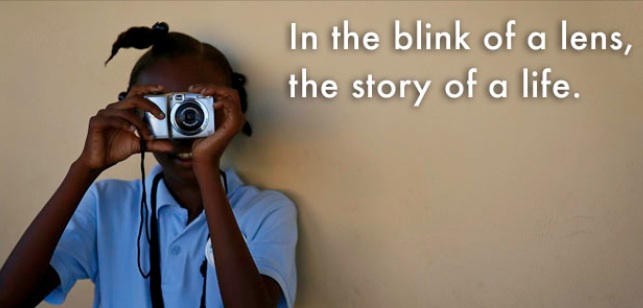
The Founder of the View Finder Workshop describes her inspiration:
“I WAS WALKING THROUGH CITÉ SOLEIL, the largest slum in the Western Hemisphere located in Haiti, one of the poorest places on Earth. Trash littered the streets and dirty stagnant rainwater was often used as latrines. The sun pulsated directly overhead, bleaching the blue sky to a blinding white. Sweat droplets raced down my spine and pooled at my lower back. Children dressed in rags – or for some, in nothing at all – played a spirited game of soccer with a half-inflated ball. I snapped a picture of a group of rambunctious kids, only to have eager young hands grab at my camera to see the image captured on my screen.
The novelty of the reproduction faded and most darted off between the shanty houses. One remained, diligently pointing at each face on the screen, as if ticking them off in his head. He stopped at the last one. His own. He let out a burst of pure, innocent, giggling glee and scampered off. Alone, I realized that for people who have next to nothing, a mirror is an unattainable luxury. This child only met his reflection by process of elimination. For he knew which ones were his friends and which one was the stranger.
I was struck dumb. For I never realized a person could walk through life without knowing his own physical self. But photography can change that. It lets a child see himself & his world through different eyes. By learning tangible skills & creating new avenues of self-expression, he can contribute to his life & his community.
And thus, the seed for View Finder Workshop was planted.”
Babita Patel.
founder, humanitarian photographer – Excerpted from the View Finder website
From that moment View Finder Workshops were born. They were born to put the camera into the hands of children who have never had a lens through which to objectively view or portray the world in which they live. Children love taking photographs, and especially love taking, and seeing photos of themselves. These are not children growing up in a “selfie” obsessed culture, but kids who may not have ever even seen a mirror image of themselves. To put a camera in their hands proves liberating and empowering in a way that is hard to imagine, until you witness the pure joy on their faces when they see the images that they capture.
Photography as a visual medium provides a creative expression and ability to both view, and share a perspective from each child’s personal lens. And there is nothing like viewing the world through the eyes of a child.
The results of last January’s workshop in Haiti in collaboration with Respire Haiti, brought fresh views to the children of Gressier, Haiti who had been serving as restaveks (children enslaved as domestic servants), orphans & other vulnerable children. The images captured were often stark and beautiful. The photos were then exhibited in September in an LA gallery show in Santa Monica where gallery patrons were able to view the results of what the children were able to capture with a camera in their hands. A few of the kid’s prints even sold!
Next the Viewfinder Workshop is gearing up for a workshop in Kenya This fall, where they will be introducing photography to 40 students enrolled at their new school in the Lenana slum, in the country’s capital, in a program that they hope to make a sustainable curiculum. These programs need support to become sustainable, and this is where you can come in. You can like View Finder on Facebook , follow on Twitter , and/or make a donation to help other children to tell their story through images. You may just be the one to benefit from the enchanting worlds they share.
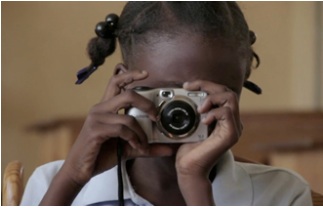
Have you ever put the camera in your own kids hands to see what they come up with?
This is an original post written for World Moms Blog by Elizabeth Atalay of documama.org.
*All photos credited to the View Finder Workshop website.

Elizabeth Atalay is a Digital Media Producer, Managing Editor at World Moms Network, and a Social Media Manager. She was a 2015 United Nations Foundation Social Good Fellow, and traveled to Ethiopia as an International Reporting Project New Media Fellow to report on newborn health in 2014. On her personal blog, Documama.org, she uses digital media as a new medium for her background as a documentarian. After having worked on Feature Films and Television series for FOX, NBC, MGM, Columbia Pictures, Warner Brothers, 20th Century Fox, and Castle Rock Pictures, she studied documentary filmmaking and anthropology earning a Masters degree in Media Studies from The New School in New York. Since becoming a Digital Media Producer she has worked on social media campaigns for non-profits such as Save The Children, WaterAid, ONE.org, UNICEF, United Nations Foundation, Edesia, World Pulse, American Heart Association, and The Gates Foundation. Her writing has also been featured on ONE.org, Johnson & Johnson’s BabyCenter.com, EnoughProject.org, GaviAlliance.org, and Worldmomsnetwork.com. Elizabeth has traveled to 70 countries around the world, most recently to Haiti with Artisan Business Network to visit artisans in partnership with Macy’s Heart of Haiti line, which provides sustainable income to Haitian artisans. Elizabeth lives in New England with her husband and four children.
More Posts

by Alison Fraser | Sep 24, 2013 | 2013, Africa, Canada, Childhood, Education, Eye on Culture, Family, Girls, Human Rights, Humanitarian, Humanity, Inspirational, International, ONE, Philanthropy, Poverty, Uncategorized, United Nations, Women's Rights, World Voice

City of Kitchener Councillor, Kelly Galloway-Sealock, and the author’s three daughters at a 2012 International Day of the Girl Child event
Mark your calendars and celebrate October 11th with your families and in your communities! Why you might ask? Well, the reasons are two-fold. Firstly, October 11th is Eleanor Roosevelt’s birthday. Eleanor was a world-renowned advocate for human rights and world peace. She was instrumental in the development and implementation of the Universal Declaration of Human Rights. So, how fitting is it that the United Nations has declared October 11th as the International Day of the Girl Child.
This October 11th marks the second annual International Day of the Girl Child. This day will be celebrated worldwide in an effort to bring attention to the human rights of girls around the world, and to highlight the gender-based struggles that so many young girls face daily.
Forced childhood marriages, rape, and female genital mutilation are just some of the issues that many little girls are forced to deal with at very early ages. In many countries, young girls are not valued and as a result are not invested in, particularly when it comes to schooling. The resulting long-term effects are alarming and have been documented in an eye-opening video by the Girl Effect movement. Please watch this video and share with friends and family – it will change the way you see the world. Girl Effect – the clock is ticking!
Last year, the focus of the very first International Day of the Girl Child was child marriage. This year, the focus will be on education. There are so many wonderful ways that you can participate in this important day. Whether you plan a family event or a community event, we all need to ensure that this very important day is recognized. Spread the word – girls are important and need to be valued, respected and treated as equal partners in our local and global communities.
What can you do to honour this important day? You can host a community screening of the Girl Rising film that is receiving acclaim worldwide. You can act to spread the word about struggles some young girls are facing in the world today. You can talk to your children about these critical issues. You can ask your child’s teacher to discuss this day with their class. You can organize a fundraising event in your office/workplace. Whatever you choose to do, whether it be large or small-scale, YOU can make a difference on October 11th!
Last year, my three young daughters tied pink ribbons in their hair and joined a local city councillor on a hike discussing the importance of human rights for all girls. It was a simple but highly effective way to celebrate this day. So many people asked them why they were wearing the ribbons, allowing them to speak about the day in their own words describing what it meant to them. It was so great to see the passion being shared by a younger generation, especially given that many of these issues are often difficult for them to understand and rationalize!
This year, we are planning a yoga event at a local studio for young boys and girls in the community. We are asking for small donations, which will then be used to support the educational needs of girls in Tanzania. In addition, my two older daughters have done small research projects on the significance of the International Day of the Girl Child, and will be presenting all that they have learned to their classmates on October 11th, thanks to the support of their teachers. I encourage you to plan an event too!Your event does not have to be fancy or sophisticated. Sometimes the smallest and simplest acts can have the greatest impact.
Let’s all celebrate October 11th together – girls are worth it!
As Eleanor Roosevelt once said;
“Where, after all, do universal human rights begin? In small places, close to home – so close and so small that they cannot be seen on any maps of the world. Yet they are the world of the individual person; the neighborhood he lives in; the school or college he attends; the factory, farm, or office where he works. Such are the places where every man, woman, and child seeks equal justice, equal opportunity, equal dignity without discrimination. Unless these rights have meaning there, they have little meaning anywhere. Without concerted citizen action to uphold them close to home, we shall look in vain for progress in the larger world.” – Eleanor Roosevelt
In what way might you celebrate the Day of The Girl Child?
This is an original World Moms Blog post written by Alison Fraser.
Alison Fraser is the mother of three young girls ranging in age from 5 to 9 years old. She lives with her family in Cambridge, Ontario, Canada. Alison works as an Environmental Toxicologist with a human environment consulting company and is an active member of the Society of Environmental Toxicology and Chemistry (SETAC). She is also the founder and director of the Canadian Not for Profit Organization, Mom2Mom Africa, which serves to fund the school fees of children and young women in rural Tanzania. Recently recognized and awarded a "Women of Waterloo Region" award, Alison is very involved in charitable events within her community including Christmas Toy and School Backpack Drives for the local foodbank.
More Posts - Website
Follow Me:


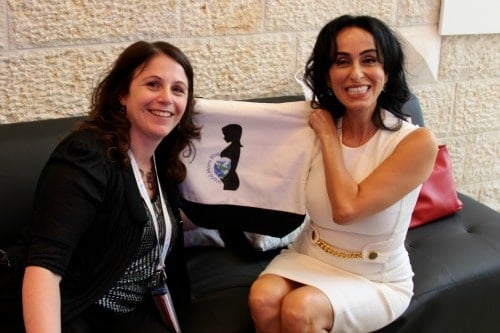
by Susie Newday (Israel) | Jul 31, 2013 | 2013, Culture, Eye on Culture, Feminism, Inspirational, Interviews, Israel, Life Lesson, Music, Parenting, Susie Newday, Uncategorized, World Events, World Interviews, World Motherhood
When you’re offered an opportunity to interview the biggest female singing sensation in your country, you jump at it. Last month during the Israeli Presidential Conference I was lucky enough to meet and interview Rita Jahan-Foruz a singer known simply as Rita.
Rita was born in Tehran, Iran and emigrated to Israel at the age of 8. Through hard work and lots of talent she became Israel’s most successful singing artist. For the last 25 years Rita has had an illustrious career both in Israel and abroad. Her latest album “My Joys” is entirely in her native language of Pharsi. That album has become a big seller on the black market in Iran where it is forbidden, along with all other Western music. Some say that Rita’s album would go gold in Iran if it wasn’t banned.
I waited in the VIP room for the interview to start, and I sat there becoming increasingly more nervous as I watched other people interview Rita and a host of other interesting people who were speaking at the conference. I did chuckle a bit to myself when Weili Dai, a top female entrepreneur and the CEO of Marvell (herself an amazing, friendly and gifted woman), came over to have her picture taken with Rita. It wasn’t the photo op that made me chuckle, it was the fact that right before the photo was snapped both of them fluffed their hair. It seems to be a universal quirk all women around the world have before being photographed. I was also quite in admiration how both of them managed to be on their feet all day in their beautiful but really high heels.
Okay, shallowness now aside.
Right before our interview started, a young man who was a waiter at the event came over, sat down on the couch next to Rita and started talking to her. It was spontaneous on his part and graciously received on her part. It was only after I had tweeted a picture of them talking and commented on how friendly Rita was that someone tweeted me back saying that the waiter is connected to an organization called OneFamily (a non-profit organization that rehabilitates, reintegrates and rebuilds the lives of Israel’s thousands of victims of terror attacks) which is a cause dear to Rita’s heart.

When it was my turn I came over, said hello and introduced myself. I sat down trying to look put together, which I can tell you is not an easy task when you are lugging a knapsack, a telephone, a tape recorder, notebook and ipad.
Before I even started asking questions, I gave Rita a World Moms Blog tote bag that Jennifer Burden, the founder of World Moms Blog, had sent me to gift to her. Rita loved it, and right away started putting all her things into it.
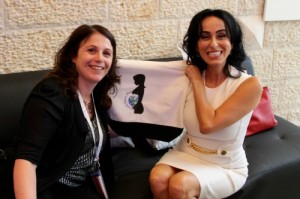
I then handed her a little gift from myself, a keychain that said in Hebrew “Music is the language of angels.” She loved that too, and you could see that her reaction was genuine and not just polite. She right away pulled out her keyring from her bag. It had lots of keys and other keychains, including one with a picture of her daughters and she clipped my gift right on. She even proudly showed it off to others.
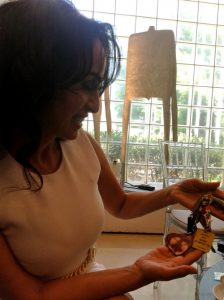
As I was about to start asking her questions, I blurted out, “I’m a bit nervous.” She looked at me in surprise and said, “Nervous? Really? Why?” as if the concept was completely foreign to her that someone would even be nervous speaking to her. That put me completely at ease, and the interview, or should I say more of a conversation, started. When I watched some of her videos later I was able to once again see her natural friendliness and charm shine through. This video of Rita recording one of her songs in Pharsi is a good example of her being down to earth and approachable.
I offered to do the interview in English or Hebrew, but Rita wanted to practice her English so we started off in English but moved back and forth. I could tell how passionate she was about certain subjects (which was often) because that was when she moved back into Hebrew in order to be able to express herself so much more freely.
Susie: World Moms Blog represents mothers from around the world. Right now we represent 20 countries including Morocco, Saudi Arabia, UAE, Egypt and many others. We write about motherhood, culture, social good, about connecting people through what they have in common.
Rita: Wow. Do you have a writer from Iran?
S: No, but if you know someone, we would love to have them on board.
I think that what you’re trying to do with music is what we at World Moms Blog are trying to do through writing, which is to bring the world together one person at a time. (Rita nodded her head at that.)
Do you see yourself as an ambassador of peace between all countries or just between Israel and Iran?
R: I think with my own existence I represent the Iranian and Israeli connection but I would love to represent as much as I can. I think that as women we have a unique way of connecting.
The male and female species are in essence two opposites. You need them both in the world, like Ying and Yang, day and night. It’s a little bit like our reproductive organs. The male behavior, like the male anatomy is surging forward, conquering, moving on with energy that is outward facing.
A woman’s energy is like our wombs. It’s meant to contain/include* and to embrace what there is no matter what. We first embrace and bring things close. We need to be able to see the strength in this, we need to influence and to realize that the place of “containing/including*” others is our strength.
It’s like a a mother who is always the center of the house. Everyone in the family comes and goes, they go a bit nuts. They cry but in the end they always come back to the middle, to the center and the nature of women is the center.
We are mothers and what happens to our children, and to the world they will inherit is important to us. We have to use our natural strengths of connecting to make sure we do what is best for them.
(*There is no great English translation for the word Rita used. The closest I got was contain but it is somewhere between contain and include with maybe a little bit of absorb.)
S: What would you suggest to women to do in order to empower themselves?
R: Not everyone can sing or dance or act or write books, but I think that each and every one of us can influence by connecting. One person connects with another and they connect with someone else from someplace place and so on. We all have to try to connect to others.
(Note: Rita is not only the best selling Israeli singer of all time, she also dances, acts and has published a children’s book. She received The Israeli Academy Award for Best Actress in 1989 for her role in The Thousand Wives of Naftali Siman-Tov, as well as the 2011 Best Actress award at the San Francisco International festival of Short Films for Ben returns Home. Her children’s book “The Girl With A Brave Heart” has been translated into English from Hebrew.)
S: That is something really close to my heart. That’s how I got to blogging, by connecting with other mothers though a forum overseas, getting to know them and having them get to know me. We were all from different cultures but we were all mothers.
One of the things which touched me was listening to you talk about how you got the love of music from your home and that your parents were very supportive of you.
R: They were supportive in their love. They didn’t understand what I was doing, going from class to class, learning acting, dancing and taking voice lessons. They didn’t understand anything about that.
S: But what I’m hearing from you is that they didn’t criticize either?
R: No they didn’t.
S: You have two daughters ages 12 and 21, right? Do you think parent/child relationships today are different then they were when you were growing up?
R: Of course. Of course. I think that back then children were not so important in what they said. They were children. Nowadays, we don’t look at children as children. They are much more important than us. We listen to them more, we are more attentive and sensitive to them. I don’t think it was like that back when I was growing up. Kids were kids. You ate and grew. No?
S: I don’t know. What I see is that kids these days are less connected to their parents than we were, at least on a daily basis. They have a lot more outlets than we had.
R: The world is changing. In this age of the television and computers, the “outside” world has more influence whereas once the “inside” world, the inner circle, had more influence.
I think that these days we give our kids so much love that maybe we spoil them too much. We are more protective of them than anyone was of us. Right?
S: I think that these days we have more to protect our children from.
R: Yes, you’re right.
S: Has fame affected your family relationship and your relationship with your daughters?
R: Of course.
S: In what ways?
R: I’m not talking about fame because fame didn’t affect anything. I am talking about not having the privacy to go for instance with my daughter to the beach. People constantly come and want to take pictures with you and you can’t possibly have privacy with your family and children outside of the house. Of course it’s something that affects you.
S: What do your children have to say about it?
R: I think they don’t like it. They are much more sensitive to people passing by and looking at them or photographing them. They are very sensitive to that.
S: Do you think your children feel any advantages of your fame?
R: Of course. They come to the concerts. They have a different type of life. Once, my daughter Meshi came home laughing at a question that someone had asked her. “What is it like to be Rita’s daughter?” She said I don’t know, I haven’t experienced anything else.
S: It sounds like she has a great sense of humor.
R: Yes, she’s amazing.
S: What is your wish for world mothers?
R: I wish for all us mothers to have the power, strength and wisdom to protect our children until they themselves have the ability to protect themselves.
I think that the most painful thing in the world is knowing that children are raped or abused and that we are not really able to protect them. That is what I am most sensitive to, knowing that somewhere out there, there is a child that is helpless and there is no one to protect him.
S: Sadly, things like that happen even to children who have people looking out for them.
R: It’s even worse when the people who are supposed to be protecting the children are the ones who do terrible things and do them harm.
S: Do you have one particular defining moment that you remember as a child?
R: Yes, yes. In Iran, my mother had a hair salon in the house. All kinds of women used to come to her. Once, a women who was almost completely bald came. All she had was wisps of hair. My mother shampooed her hair and while she was doing her hair she kept telling her you’re so beautiful, look how beautiful you are, you’re so wonderful.
I was 6, and my sister who is four years older than me was 10. My mother was working in our bedroom like she always did because that was also her work room. When the woman left, my sister said to my mother, why are you such a liar? How could you tell her she was beautiful? She was bald, she almost didn’t have any hair.
My mother then asked my sister, why do you think I was lying? My sister said, you told her how beautiful she was, what beautiful eyes she has, but she was bald. My mother then gently asked my sister, but did you look at her eyes? Her eyes were very beautiful.
And that’s the lesson I quietly learned there.
S: It seems to me that that is exactly what your book teaches, to look past the outer and see the beauty and kindness that is in each person.
R: That’s what I learned my whole life from my mother. When she looks at someone, first and foremost she looks for what’s beautiful in the person. That’s the way she sees people. That was a very big life lesson for me.
Every time I tell this story I still have goosebumps.
S: I find it amazing that I didn’t even know about your book until one of the other World Mom Bloggers told me that you had written one and it had been translated to English.
R: The book is gaining incredible momentum.
S: It should. It’s a great book with a great message and great illustrations.
(Note: The book is called The Girl With a Brave Heart. I read it in Hebrew and I love the many messages in it including the fact that people don’t always know how to ask for what they need and that we should let our hearts lead the way.)
Of course that’s when I pulled out the two copies of her book that I bought along for her to sign. I handed her a pen but she searched her bag because she has a special marker for signing books.
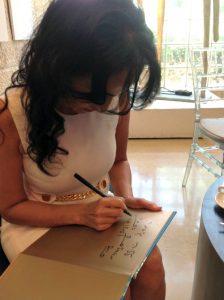
There is something so nice about talking to someone who is famous, who has performed for world leaders, who has bought so much joy to others through her music, yet still makes you feel no less important than she is. Maybe one day I will get to speak to her again because I really enjoyed our conversation.
I really hope Rita has unparalleled success in bringing people and countries together through her music. My wish for her is that one day she will get to perform in her native country of Iran, something that will mean that peace and acceptance has finally come to our world.
Before Rita’s performance at the UN’s main assembly hall, secretary-general Ban Ki Moon told Rita that many revolutions started from music and that it’s a place that politicians can never enter.
What do you think? Do you think music and musicians can help bring about change and be a conduit for peace?
This has been an original post to World Moms Blog by Susie Newday of Israel. You can find her positive thoughts on her blog, New Day New Lesson.
Photo credit to the author.
Susie Newday is a happily-married American-born Israeli mother of five. She is an oncology nurse, blogger and avid amateur photographer.
Most importantly, Susie is a happily married mother of five amazing kids from age 8-24 and soon to be a mother in law. (Which also makes her a chef, maid, tutor, chauffeur, launderer...) Susie's blog, New Day, New Lesson, is her attempt to help others and herself view the lessons life hands all of us in a positive light. She will also be the first to admit that blogging is great free therapy as well. Susie's hope for the world? Increasing kindness, tolerance and love.
You can also follow her Facebook page New Day, New Lesson where she posts her unique photos with quotes as well as gift ideas.
More Posts - Website
Follow Me:






 The day I gave birth to my son, HJ, is a day I’ll never forget. Induction nightmare? Check. Post baby snuggles? Check. September 3rd birth date? Check.
The day I gave birth to my son, HJ, is a day I’ll never forget. Induction nightmare? Check. Post baby snuggles? Check. September 3rd birth date? Check.



